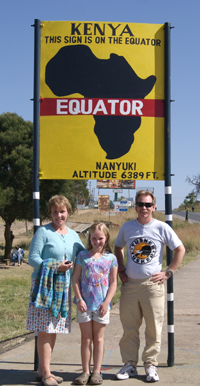|
By Cindy Abole
Public Relations
In children's author
Lynne Barasch's book, "First Come the Zebra," the story focuses on the
cultural struggles of two Kenyan boys, who grew up as enemies from
rival tribes, but who work together and overcome conflict by realizing
their differences and coexisting in harmony, hope and friendship.
 Registered nurse Kathleen White visits Kenya for the
first time in 26 years with her husband, Bryan and daughter, Amelia. Registered nurse Kathleen White visits Kenya for the
first time in 26 years with her husband, Bryan and daughter, Amelia.
It's a theme that
resonates loudly for Kenyan-born neonatal nurse educator Kathleen
White. Drawing from her multicultural childhood in East Africa, White
wants to be a catalyst for positive change among students and
practitioners in health care focusing on respect, collaboration and
acceptance. For the past year, White has worked with campus leaders,
students and individuals to address prejudice, discrimination and
conflict by developing dialogue skills through MUSC's National
Coalition Building Institute (NCBI) program.
White is among four
women at MUSC honored as part of the 2011 National Women's History
Month celebrating leadership and excellence. This year's theme, Our
History is Our Strength, recognizes 100 years of women's achievements
around the world.
White is the
youngest of four children born to American career missionaries
affiliated with the Africa Inland Mission International, and grew up
with the Kikuyu people in the central highlands of Kenya, East Africa.
The Kikuyu tribe led the uprising against British colonialism resulting
in Kenya gaining its independence in 1963. White has seen first-hand
the results of the country's tribal tensions, affecting the government,
land and everyday lives of the Kenyan people.
As a child, she
remembers watching visiting missionary doctors and nurses caring for
and treating the men, women and children in the Naro Moru and Kijabe
communities where she grew up. Their presence and influence had such an
effect on her that her mother made her a child's nursing outfit to play
in. It was her first introduction to nursing and health care.
In January, White
and her husband, Bryan, and 10-year- old daughter, Amelia, returned to
her native Kenya and visited towns and villages from the Great Rift
Valley to Mount Kenya and Kenya's eastern coast.
"It was a trip of a
lifetime for me and my family," said White, about her homecoming after
a 26-year absence. "Although Kenya has progressed and seen growth in
its cities and towns, there are still dramatic socio-economic
contrasts."
Embracing her past,
White has always shared an intercultural spirit and non-judgemental
attitude with others as a nursing student studying at Columbia
University in New York's inner city and throughout her career as a
NNICU nurse in Michigan, Illinois, Virginia and South Carolina. She
came to MUSC in 1990 to manage the Children's Hospital's neonatal
intensive care unit (NNICU) services. Then, she received her master's
degree in nursing from MUSC's College of Nursing and worked as a
neonatal nurse practitioner. She spent two years with facilities
management as a
nurse consultant and
project manager before returning to the NNICU as nurse educator.
Deb Browning, R.N., Perinatal Service Line clinical director, works
closely with White in the NNICU.
"Kathleen's an
organized, dependable and genuinely caring person who has great empathy
for others," Browning said, of her friend and colleague. "She is
focused on improving neonatal outcomes by use of evidence-based nursing
practices. She brings a lot to the table within Perinatal Services."
Wanting to do more
beyond the clinical setting, White got involved with the Office of
Diversity's NCBI Welcoming Diversity training and communications
workshops to promote campus diversity and reduce prejudice and
conflict. She found it easy to teach students, faculty and employees
behaviors she was passionate about. She's collaborated with NCBI campus
director DaNine Fleming, Ed.D., and other colleagues as an active
trainer and mentor with the NCBI Campus Leadership Team.
The Office of
Student Diversity's associate director Laurie Charles, Ph.D., remembers
how White voluntarily completed the three-day diversity training
workshop and other education required by leadership team participants.
"Kathleen easily stepped into the role of leader throughout the
program. She was extremely thoughtful in her planning and cited from
both personal and professional experiences to emphasize specific
information. It was a delight to watch her interact and connect with
others," said Charles.
White continues to
make a difference whether she's guiding neonatal nurses in the units or
teaching the value of diversity and interprofessionalism with
physicians, nurses and other health care professionals in training.
"This level of
training and skills building is so important in health care today,"
White said. She believes hospitals and higher learning institutions are
in a vulnerable time. "With diminishing resources and greater demands
in terms of quality and compassionate care for our patients, health
care professionals need to work effectively together now more than
ever. It is essential that we use collaborative-building skills to work
through the relational struggles that role diversity brings. If not,
people look to their own self interests, naturally pulling away from
one another, which leads to struggles reminiscent of those amongst the
tribes in Kenya. It doesn't have to be that way.
"My hope is that if
we choose to do this work, our interprofessional relationships and
clinical outcomes will both improve," she said.
It's a
hope-among-struggle belief that White has grown up with and passes on
to daughter, Amelia.
Women's History Month
"Our History is Our Strength"
A panel discussion, featuring Romina McCandles, Dale Rosengarten,
Teresa Gore and Joyce Coakley, will be held from noon to 1 p.m. March
31, Room 100, Basic Science Building
|



